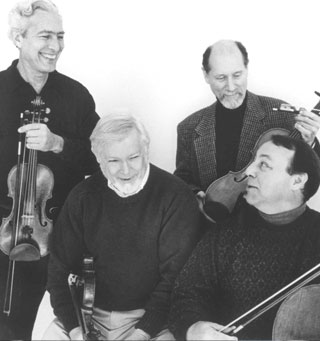Guarneri Quartet Bows Out in Buffalo
by Jan Jezioro
A Farewell in Four

The Buffalo Chamber Music Society presents the legendary Guarneri String Quartet in the last program in its 2008-2009 season at 8pm on Tuesday, May 12 in the Mary Seaton Room of Kleinhans Music Hall. The eagerly anticipated event will be touched with just a hint of melancholy for the many admirers of the group in the Buffalo audience. Formed in 1964, the Guarneri String Quartet will be playing in Buffalo for the very last time as part of their final tour, having announced its retirement in the fall of this year.
Remarkably, for the first 37 of its nearly 45 years, from its formation at the Marlboro Music Festival, the same four members of the quartet—Arnold Steinhardt and John Dalley, violins, Michael Tree, viola, who all studied at the Curtis Institute of Music in Philadelphia, along with David Soyer, cello—played together until 2000, an unique achievement among existing string quartets. When the constant travelling became too much of a burden for Soyer, he was replaced by his own student, Peter Wiley, who had been for many years the cellist of the Beaux Arts Trio.
Over the many decades of its existence, the Guarneri String Quartet has toured North and South America, Europe, Asia, and Australia to great acclaim. Buffalo has always been a favored stop for the members of the group, now based at the University of Maryland, who continuing teaching at the Curtis Institute. The quartet’s many area appearances have included a memorable performance of the complete Beethoven string quartets, as part of the Slee Beethoven Cycle, inaugurating the opening of the new Slee Hall on the UB Amherst campus back in the late 1980s, in addition to numerous appearances on the Buffalo Chamber Music Society series over the years.
One reason for the long-lasting popularity of the Guarneri String Quartet has been its total emotional commitment to the expressive spirit of the music that it has played.
One local admirer remembers hearing the quartet back in the late 1960s and being particularly struck by how the vibratos of all the players were completely synchronized to great effect. Yet, the often genial warmth of the group’s playing was always realized by the individual strengths of each musician, producing a unique sound that has always been readily discernible from the many younger quartets who have followed its pioneering role on the American chamber music scene. While there may be some string quartets that play faster, louder, and, perhaps, sometimes more precisely than the Guarneri Quartet, it is safe to say that no other group plays with greater musicianship. The title of Guarneri first violinist Arnold Steinhardt’s 1998 book Indivisible By Four: A String Quartet in Pursuit of Harmony, aptly captures both the goal and the result of four lives, devoted to the performance of chamber music.
Tuesday’s program features both a look back to the origins of the string quartet as a musical form and a pair of 20th-century masterpieces. Because of his contributions to both genres, along with being known as the father of the symphony, Franz Joseph Haydn is also known as the father of the string quartet, having composed some 68 quartets.
Haydn’s late String Quartet Op. 74, No. 3 in G Minor, was composed in 1793, and it is dedicated to the Hungarian Count Anton Apponyi, a relative of his patron Count Esterhazy. Known as The Rider Quartet, because of the rhythmical beginnings of the two outer movements, the popular work last appeared on a Buffalo Chamber Music Society program, surprisingly, in 1965. Maurice Ravels’ only work in the genre, the ethereal String Quartet in F Major, has always been an audience favorite, having previously appeared on Buffalo Chamber Music Society programs no fewer than 18 times, and the Guarneri Quartet last played the Ravel work here in December 1969. This past February, SONY Music released a new recording, The Hungarian Album, containing two quartets by Dohnányi’, and the String Quartet No. 2, Op.10 by Zoltán Kodály. The Guarneri Quartet last played the Kodály on a Buffalo Chamber Music Society program in 1999, and its performance on Tuesday will be a welcome return of a work often overshadowed by the quartets of Kodály’s fellow Hungarian ethnomusicologist and friend Bela Bartók. Kodály’s 1916 work, based on his ethno-musicological research, reflects a strong folk element, and it creates a new tonal language that is full of the evocative sounds of nature and the unusual rhythms and meters of folk music.
For more information, visit www.bflochambermusic.org or phone 462-4939. Tickets are $20 general admission, $10 for students.
blog comments powered by Disqus|
Issue Navigation> Issue Index > v8n19 (Week of Thursday, May 7, 2009) > Guarneri Quartet Bows Out in Buffalo This Week's Issue • Artvoice Daily • Artvoice TV • Events Calendar • Classifieds |









 Current Issue
Current Issue